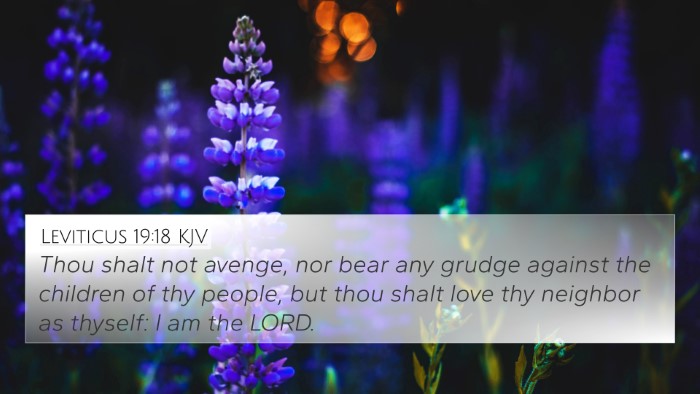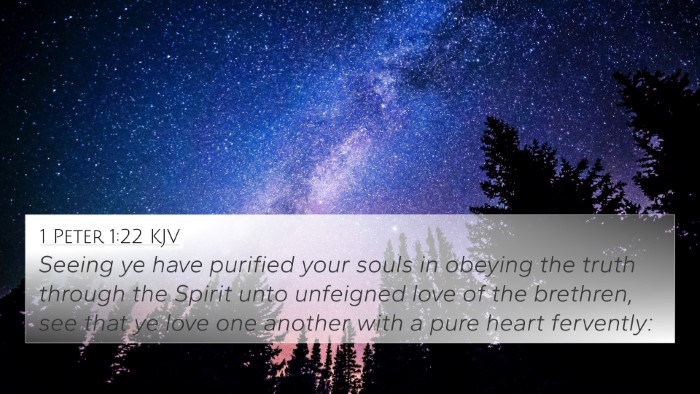Meaning and Interpretation of 1 Thessalonians 5:15
1 Thessalonians 5:15 states: "See that none render evil for evil unto any man; but ever follow that which is good, both among yourselves, and to all men." This verse is a profound exhortation centered on the Christian ethos of love and goodwill. It invites readers to uphold the principles of kindness and mercy in the face of wrongdoing.
Summary of Insights from Public Domain Commentaries
Matthew Henry's Commentary
Matthew Henry emphasizes the importance of Christian conduct, indicating that believers must resist the natural impulse to retaliate. He asserts that instead of yielding to revenge, Christians should pursue good deeds and maintain harmony within the community. Henry encourages believers to embody a spirit of benevolence, highlighting the implications of Jesus’ teachings on non-retaliation.
Albert Barnes' Notes on the Bible
Albert Barnes interprets this verse as a clear directive against the cycle of vengeance. He explains that rendering evil for evil goes against Christian values and is harmful both to the individual and the wider community. Barnes sheds light on the essential nature of pursuing good as a deliberate choice, suggesting that Christians are called to be proactive in their goodness towards others, irrespective of the actions of those around them.
Adam Clarke's Commentary
Adam Clarke adds layers to the meaning by underscoring the universal applicability of this teaching. He points out that the instruction to follow good pertains not only among believers but also extends to all men. Clarke connects this moral principle with broader biblical themes, suggesting that this verse encapsulates the heart of Christ-like love that transcends personal relationships and biases.
Cross-Referencing Biblical Texts
To deepen our understanding of 1 Thessalonians 5:15, we can look at several related scriptures that echo its themes of non-retaliation and the pursuit of good:
- Romans 12:17-21: "Recompense to no man evil for evil... Therefore if thine enemy hunger, feed him; if he thirst, give him drink." This passage reinforces the principle of responding to evil with good.
- Matthew 5:39: "But I say unto you, That ye resist not evil: but whosoever shall smite thee on thy right cheek, turn to him the other also." This is a direct teaching from Jesus about non-retaliation.
- Luke 6:27-28: "But I say unto you which hear, Love your enemies, do good to them which hate you..." This passage emphasizes love and good deeds towards adversaries.
- Galatians 5:15: "But if ye bite and devour one another, take heed that ye be not consumed one of another." This warns against internal conflict among believers.
- 1 Peter 3:9: "Not rendering evil for evil, or railing for railing: but contrariwise blessing..." This verse closely parallels the message of 1 Thessalonians 5:15, urging a counter-cultural response to wrongs.
- Proverbs 20:22: "Say not thou, I will recompense evil; but wait on the Lord, and he shall save thee." This proverb reflects the wisdom of trusting God rather than seeking revenge.
- Ephesians 4:32: "And be ye kind one to another, tenderhearted, forgiving one another, even as God for Christ's sake hath forgiven you." It highlights the essence of kindness and forgiveness.
- Philippians 2:3: "Let nothing be done through strife or vainglory; but in lowliness of mind let each esteem other better than themselves." This verse encourages humility and the prioritization of others.
- James 3:18: "And the fruit of righteousness is sown in peace of them that make peace." This underscores the yield of peaceful actions as beneficial.
Thematic Connections
The teachings found in 1 Thessalonians 5:15 resonate across many Biblical texts, showcasing a significant theme in Scripture: the call to pursue goodness and peace. The connection between these verses offers rich material for comparative Bible verse analysis:
- Inter-Biblical Dialogue: The uniformity in message across the Old and New Testament stresses a divine emphasis on mercy and kindness.
- Tools for Bible Cross-Referencing: Utilizing a Bible concordance can reveal additional cross-references to enhance understanding.
- Scriptural Cross-Referencing: By studying parallel passages, one can derive deeper spiritual insights and practical applications.
Applying the Verse Today
In our current context, the call to "ever follow that which is good" serves as a vital reminder to cultivate a posture of love and kindness in all situations. Whether in personal relationships, workplaces, or broader societal interactions, believers are encouraged to adopt a proactive approach to goodness. This not only aligns with Christian principles but also contributes positively to the world around us.
Conclusion
The exploration of 1 Thessalonians 5:15 reveals deep truths about non-retaliation, promoting goodness, and embodying Christ-like love. Through the insights gleaned from esteemed commentaries and the cross-referencing of related scriptures, one can appreciate the richness of this command and its significance in fostering a community rooted in love and peace.


























